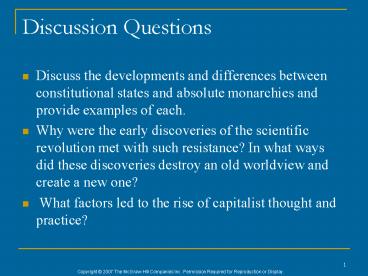Discussion Questions - PowerPoint PPT Presentation
1 / 35
Title:
Discussion Questions
Description:
Why were the early discoveries of the scientific revolution met with such resistance? In what ways did these discoveries ... Deism. 35. The Theory of Progress ... – PowerPoint PPT presentation
Number of Views:45
Avg rating:3.0/5.0
Title: Discussion Questions
1
Discussion Questions
- Discuss the developments and differences between
constitutional states and absolute monarchies and
provide examples of each. - Why were the early discoveries of the scientific
revolution met with such resistance? In what ways
did these discoveries destroy an old worldview
and create a new one? - What factors led to the rise of capitalist
thought and practice?
2
(No Transcript)
3
The Protestant Reformation
- Martin Luther (1483-1546)
- Indulgences
- Ninety-Five Theses
- New printing technology
- Excommunicated - 1521
- 1520s-1530s dissent
4
Martin Luther Posting 95 Theses
5
The Demand for Reform
- Luthers critique
- Closure of monasteries
- Translations of Bible
- Decline in priestly authority
- Return to biblical text for authority
- German princes interested
- Local control
6
Reform outside Germany
- Switzerland, Low Countries
- England King Henry VIII (r. 1509-1547)
- France John Calvin (1509-1564) - Protestant
- Scotland, Netherlands, Hungary reform
7
The Catholic Reformation
- Roman Catholic reaction
- Council of Trent (1545-1563)
- Society of Jesus (Jesuits), St. Ignatius Loyola
(1491-1556) - Education
- Missionaries
8
Witch Hunts
- Tension between Catholics and Protestants
- Devil and human assistants (15th c.)
- Mostly single or widowed women
9
Religious Wars
- Protestants and Roman Catholics - France
(1562-1598) - 1588 Philip II of Spain attacked England
- Attempt return to Catholicism
- Spanish ships destroyed
- Netherlands independence - 1610
10
The Thirty Years War (1618-1645)
- Holy Roman emperor Bohemians
- Conflict spreads
- Primarily Germany
- Political, economic issues
- 1/3 Germans destroyed
11
Consolidation of Sovereign States
- Holy Roman Emperor Charles V (r. 1519-1556)
- Marriage, political alliances attempted
consolidation - Failed
- Protestant Reformation independence
- France, Ottoman Empire
- Europe - individual states
- Charles V abdicated
12
Sixteenth-century Europe
13
The New Monarchs
- Italy - trade, manufacturing, finance
- England, France, and Spain - tax revenues (16th
c) - England Henry VIII
- Fines and fees confiscated monastic holdings
- France Louis XI, Francis I
- Sales, salt trade
14
The Spanish Inquisition
- Fernando and Isabel 1478
- Judaism or Islam, later Protestants
- Imprisonment, executions
- Intimidated nobles
- Archbishop of Toledo imprisoned 1559-1576
15
Constitutional States
- England and Netherlands - popular representation
- England constitutional monarchy
- Netherlands republic
- English Civil War, 1642-1649
- Tax opposition
- Anglican church vs Calvinist Puritans
- King Charles I vs parliament
- King beheaded - 1649
16
Charles I of England
17
The Glorious Revolution (1688-1689)
- Puritan dictatorship
- Monarchy restored 1660
- Bloodless
- King James II deposed
- Mary and William of Orange
- Shared governance between crown and parliament
18
The Dutch Republic
- King Philip II of Spain vs Calvinists in
Netherlands, 1566 - Rebellion 1581. Netherlands declared
independence - Representative parliamentary system
19
Absolute Monarchies
- Divine Right of Kings
- French absolutism
- Cardinal Richelieu
- Centralization
- Bureaucracy
- Calvinists attacked
20
Louis XIV (The Sun King, 1643-1715)
- Létat, cest moi
- Versailles (1670s)
- Power centered in court
21
Louis XIV and Moliere
22
Russia The Romanovs (1613-1917)
- Peter I (the Great, r. 1682-1725)
- Modernized Russia
- St. Petersburg
- Catherine II (the Great, r. 1762-1796)
- Military expansion
- Partitions of Poland, 1772-1797
- Initial reforms
- Pugachev rebellion (1773-1774)
23
Cathedral of the Dormition
24
The European States System
- Peace of Westphalia (1648)
- European states sovereign and equal
- Domestic affairs protected
- Seven Years War
- Tenuous balance of power
- Military technology
25
Population Growth and Urbanization
- Columbian Exchange growing population
- Improved nutrition
- Potato
- Susceptibility to plague
26
Population Growth in Europe
27
Urbanization
Compare to Roman Empire and Han Dynasty
28
Early Capitalism
- Free market
- Individuals own means of production
- Private initiative
- Supply and demand
- Banks, stock exchanges
- Joint-Stock Companies (English East India
Company, VOC) - Empire-building
- Putting-out system
- Not guilds
29
Impact of Capitalism on the Social Order
- Decrease in rural population
- Serfdom-inefficient
- Europe forsakes
- Russia retains until 19th c.
- Nuclear families
- Gender changes
30
Capitalism and Morality
- Adam Smith (1723-1790)
- Increased poverty in some sectors
- Rise in crime
- Witch-hunting?
31
The Copernican Universe
- Reconception of the Universe
- Claudius Ptolemy
- Christians - heaven - last sphere
- Observations contradict
- Nicholas Copernicus (1543)
- Moving Earth
32
Ptolemaic System
33
The Scientific Revolution
- Copernican model
- Johannes Kepler (Germany, 1571-1630)
- Galileo Galilei (Italy, 1564-1642)
- Physics - Isaac Newton (1642-1727)
- Challenge to church
34
The Enlightenment
- Rational thought and scientific analysis
- John Locke (England, 1632-1704) politics
- France philosophes
- Voltaire (1694-1778)
- Deism
35
The Theory of Progress
- Enlightenment would ultimately lead to human
harmony, material wealth - Decline in authority of organized religion































